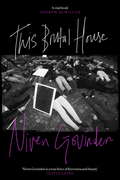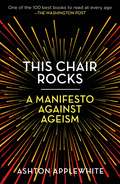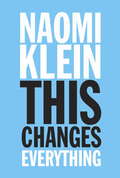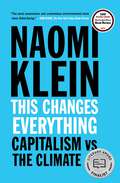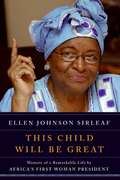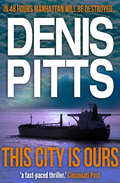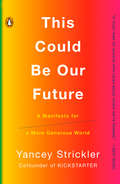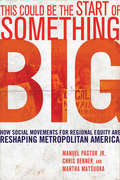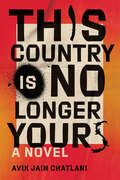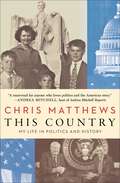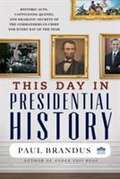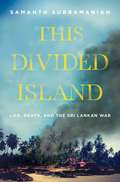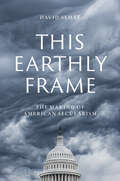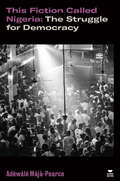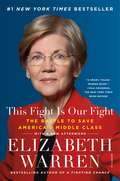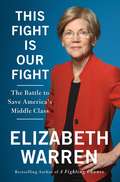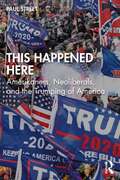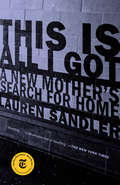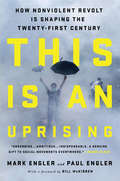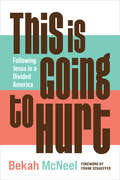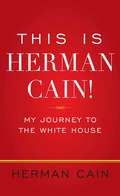- Table View
- List View
This Bridge Will Not Be Gray
by Dave EggersIn this delightfully original take on nonfiction, bestselling author Dave Eggers tackles one of the most famous architectural and natural monuments in the world: the Golden Gate Bridge. Cut-paper illustrations by Tucker Nichols ensures that this book feels like a special object, and the revised edition includes real-life letters from constituents making the case for keeping the bridge orange. The narrative's sly humor makes the topic perfectly accessible for kids enthusiastic about nonfiction. This one-of-a-kind book transports readers to the glorious Golden Gate, no matter where they live.
This Brutal House: Shortlisted for the Gordon Burn Prize 2019
by Niven GovindenSHORTLISTED FOR THE GORDON BURN PRIZE 2019'A true force of fierceness and beauty' OLIVIA LAING 'A vital book' ANDREW MCMILLAN'This Brutal House leaves its reader full of a powerful, protesting energy' IRISH TIMES 'A powerful and poetic book' KERRY HUDSONOn the steps of New York's City Hall, five ageing Mothers sit in silent protest. They are the guardians of the vogue ball community - queer men who opened their hearts and homes to countless lost Children, providing safe spaces for them to explore their true selves.Through epochs of city nightlife, from draconian to liberal, the Children have been going missing; their absences ignored by the authorities and uninvestigated by the police. In a final act of dissent the Mothers have come to pray: to expose their personal struggle beneath our age of protest, and commemorate their loss until justice is served.Watching from City Hall's windows is city clerk, Teddy. Raised by the Mothers, he is now charged with brokering an uneasy truce.With echoes of James Baldwin, Marilynne Robinson and Rachel Kushner, Niven Govinden asks what happens when a generation remembered for a single, lavish decade has been forced to grow up, and what it means to be a parent in a confused and complex society.
This Chair Rocks: A Manifesto Against Ageism
by Ashton ApplewhiteAuthor, activist, and TED speaker Ashton Applewhite has written a rousing manifesto calling for an end to discrimination and prejudice on the basis of age.In our youth obsessed culture, we’re bombarded by media images and messages about the despairs and declines of our later years. Beauty and pharmaceutical companies work overtime to convince people to purchase products that will retain their youthful appearance and vitality. Wrinkles are embarrassing. Gray hair should be colored and bald heads covered with implants. Older minds and bodies are too frail to keep up with the pace of the modern working world and olders should just step aside for the new generation. Ashton Applewhite once held these beliefs too until she realized where this prejudice comes from and the damage it does. Lively, funny, and deeply researched, This Chair Rocks traces her journey from apprehensive boomer to pro-aging radical, and in the process debunks myth after myth about late life. Explaining the roots of ageism in history and how it divides and debases, Applewhite examines how ageist stereotypes cripple the way our brains and bodies function, looks at ageism in the workplace and the bedroom, exposes the cost of the all-American myth of independence, critiques the portrayal of elders as burdens to society, describes what an all-age-friendly world would look like, and offers a rousing call to action. It’s time to create a world of age equality by making discrimination on the basis of age as unacceptable as any other kind of bias. Whether you’re older or hoping to get there, this book will shake you by the shoulders, cheer you up, make you mad, and change the way you see the rest of your life. Age pride!“Wow. This book totally rocks. It arrived on a day when I was in deep confusion and sadness about my age. Everything about it, from my invisibility to my neck. Within four or five wise, passionate pages, I had found insight, illumination, and inspiration. I never use the word empower, but this book has empowered me.”—Anne Lamott, New York Times bestselling author
This Changes Everything: Capitalism vs. The Climate
by Naomi KleinThe most important book yet from the author of the international bestseller The Shock Doctrine, a brilliant explanation of why the climate crisis challenges us to abandon the core “free market” ideology of our time, restructure the global economy, and remake our political systems.<P> In short, either we embrace radical change ourselves or radical changes will be visited upon our physical world. The status quo is no longer an option.<P> In This Changes Everything Naomi Klein argues that climate change isn’t just another issue to be neatly filed between taxes and health care. It’s an alarm that calls us to fix an economic system that is already failing us in many ways. Klein meticulously builds the case for how massively reducing our greenhouse emissions is our best chance to simultaneously reduce gaping inequalities, re-imagine our broken democracies, and rebuild our gutted local economies. She exposes the ideological desperation of the climate-change deniers, the messianic delusions of the would-be geoengineers, and the tragic defeatism of too many mainstream green initiatives. And she demonstrates precisely why the market has not—and cannot—fix the climate crisis but will instead make things worse, with ever more extreme and ecologically damaging extraction methods, accompanied by rampant disaster capitalism.<P> Klein argues that the changes to our relationship with nature and one another that are required to respond to the climate crisis humanely should not be viewed as grim penance, but rather as a kind of gift—a catalyst to transform broken economic and cultural priorities and to heal long-festering historical wounds. And she documents the inspiring movements that have already begun this process: communities that are not just refusing to be sites of further fossil fuel extraction but are building the next, regeneration-based economies right now.<P> Can we pull off these changes in time? Nothing is certain. Nothing except that climate change changes everything. And for a very brief time, the nature of that change is still up to us.
This Changes Everything: Capitalism vs. The Climate
by Naomi KleinThe most important book yet from the author of the international bestseller The Shock Doctrine, a brilliant explanation of why the climate crisis challenges us to abandon the core &“free market&” ideology of our time, restructure the global economy, and remake our political systems.In short, either we embrace radical change ourselves or radical changes will be visited upon our physical world. The status quo is no longer an option. In This Changes Everything Naomi Klein argues that climate change isn’t just another issue to be neatly filed between taxes and health care. It’s an alarm that calls us to fix an economic system that is already failing us in many ways. Klein meticulously builds the case for how massively reducing our greenhouse emissions is our best chance to simultaneously reduce gaping inequalities, re-imagine our broken democracies, and rebuild our gutted local economies. She exposes the ideological desperation of the climate-change deniers, the messianic delusions of the would-be geoengineers, and the tragic defeatism of too many mainstream green initiatives. And she demonstrates precisely why the market has not—and cannot—fix the climate crisis but will instead make things worse, with ever more extreme and ecologically damaging extraction methods, accompanied by rampant disaster capitalism. Klein argues that the changes to our relationship with nature and one another that are required to respond to the climate crisis humanely should not be viewed as grim penance, but rather as a kind of gift—a catalyst to transform broken economic and cultural priorities and to heal long-festering historical wounds. And she documents the inspiring movements that have already begun this process: communities that are not just refusing to be sites of further fossil fuel extraction but are building the next, regeneration-based economies right now. Can we pull off these changes in time? Nothing is certain. Nothing except that climate change changes everything. And for a very brief time, the nature of that change is still up to us.
This Child Will Be Great: Memoir of a Remarkable Life by Africa's First Woman President
by Ellen Johnson Sirleaf?“Exceptionally well written, a true story that seems as much a thriller as the remembrances of an ambitious and brave woman. . . . This timely book. . . is a lesson in courage and perseverance.” — Washington PostAn inspirational memoir from Africa’s first elected female president about her improbable rise to international prominence, her fight for political freedom, and her unwavering determination to rebuild her nation—Liberia—in the wake of civil warIn January 2006, after the Republic of Liberia had been racked by fourteen years of brutal civil conflict, Ellen Johnson Sirleaf—Africa's "Iron Lady"—was sworn in as president, an event that marked a tremendous turning point in the history of the West African nation.In this stirring memoir, Sirleaf shares the story of her rise to power, including her early childhood; her experiences with abuse, imprisonment, and exile; and her fight for democracy and social justice. She reveals her determination to succeed in multiple worlds, from her studies in the United States to her work as an international bank executive, to campaigning in some of Liberia's most desperate and war-torn villages and neighborhoods. It is the tale of an outspoken political and social reformer who fought the oppression of dictators and championed change. By telling her story, Sirleaf encourages women everywhere to pursue leadership roles at the highest levels of power, and gives us all hope that we can change the world.
This City Is Ours: A Novel
by Denis PittsManhattan is held for ransom in this “competent and exciting book” from the acclaimed thriller writer of The Predator (The New York Times). It’s New Year’s Eve and Manhattan is rendered motionless by a blizzard of ice and snow. On top of that, there’s a terrorist ultimatum: $130 billion dollars in forty-eight hours, or else . . . The world’s largest supertanker, five-hundred thousand tons of black nitro and steel, is moored near the city. Soon it will ignite in a blast of atomic fury, engulfing Manhattan in a mushroom cloud of searing death and destruction. That is, if no one can stop it. Newly-elected mayor Ben Boyle, ex-plumber, a commonsense man of uncommon courage, takes on the toughest job of all: negotiating with the world’s richest banks for money, and in a city of millions, searching for just one man. Holed up in a sleazy Times Square hotel, the calculating Cherokee terrorist George Mahle waits. With his plan going perfectly, he watches as New York begins to collapse. Follow Boyle’s race against time in this thrilling tale of deadly machinations, detailed drama and political scheming. “A fast-paced thriller.” —The Cincinnati Post “Tense, exciting . . . Expertly and vividly written.” —The Columbus Dispatch “A major work that every city and inhabitant of the city can take a lesson from . . . A well-written, well-developed novel.” —South Bend Tribune
This Contested Land: The Storied Past and Uncertain Future of America's National Monuments
by McKenzie LongOne woman&’s enlightening trek through the natural histories, cultural stories, and present perils of thirteen national monuments, from Maine to Hawaii—now available in paperbackThis land is your land. When it comes to national monuments, the sentiment could hardly be more fraught. Gold Butte in Nevada, Organ Mountains–Desert Peaks in New Mexico, Katahdin Woods and Waters in Maine, Cascade–Siskiyou in Oregon and California: these are among the thirteen natural sites McKenzie Long visits in This Contested Land, an eye-opening exploration of the stories these national monuments tell, the passions they stir, and the controversies surrounding them today. Starting amid the fragrant sagebrush and red dirt of Bears Ears National Monument on the eve of the Trump Administration&’s decision to reduce the site by 85 percent, Long climbs sandstone cliffs, is awed by Ancestral Pueblo cliff dwellings and is intrigued by 4,000-year-old petroglyphs. She hikes through remote pink canyons recently removed from the boundary of Grand Staircase–Escalante, skis to a backcountry hut in Maine to view a truly dark night sky, snorkels in warm Hawaiian waters to plumb the meaning of marine preserves, volunteers near the most contaminated nuclear site in the United States, and witnesses firsthand the diverse forms of devotion evoked by the Rio Grande. In essays both contemplative and resonant, This Contested Land confronts an unjust past and imagines a collaborative future that bears witness to these regions&’ enduring Indigenous connections. From hazardous climate change realities to volatile tensions between economic development and environmental conservation, practical and philosophical issues arise as Long seeks the complicated and often overlooked—or suppressed—stories of these incomparable places. Her journey, mindfully undertaken and movingly described, emphasizes in clear and urgent terms the unique significance of, and grave threats to, these contested lands.
This Could Be Our Future: A Manifesto for a More Generous World
by Yancey StricklerA vision for building a society that looks beyond money and toward maximizing the values that make life worth living, from the cofounder of KickstarterWestern society is trapped by three assumptions: 1) That the point of life is to maximize your self-interest and wealth, 2) That we're individuals trapped in an adversarial world, and 3) That this is natural and inevitable. These ideas separate us, keep us powerless, and limit our imagination for the future. It's time we replace them with something new.This Could Be Our Future is about how we got here, and how we change course. While the pursuit of wealth has produced innovation and prosperity, it also established an implicit belief that the right choice in every decision is whichever option makes the most money. The answer isn't to get rid of money; it's to expand our concept of value. By assigning rational value to other values besides money--things like community, purpose, and sustainability--we can refocus our energies to build a society that's generous, fair, and ready for the future. By recalibrating our definition of value, a world of scarcity can become a world of abundance.Hopeful but firmly grounded, full of concrete solutions and bursting with creativity, This Could Be Our Future brilliantly dissects the world we live in and shows us a road map to the world we are capable of making.
This Could Be the Start of Something Big: How Social Movements for Regional Equity Are Reshaping Metropolitan America
by Chris Benner Martha Matsuoka Manuel Pastor Jr.For nearly two decades, progressives have been dismayed by the steady rise of the right in U.S. politics. Often lost in the gloom and doom about American politics is a striking and sometimes underanalyzed phenomenon: the resurgence of progressive politics and movements at a local level. Across the country, urban coalitions, including labor, faith groups, and community-based organizations, have come together to support living wage laws and fight for transit policies that can move the needle on issues of working poverty. Just as striking as the rise of this progressive resurgence has been its reception among unlikely allies. In places as diverse as Chicago, Atlanta, and San Jose, the usual business resistance to pro-equity policies has changed, particularly when it comes to issues like affordable housing and more efficient transportation systems. To see this change and its possibilities requires that we recognize a new thread running through many local efforts: a perspective and politics that emphasizes "regional equity." Manuel Pastor Jr., Chris Benner, and Martha Matsuoka offer their analysis with an eye toward evaluating what has and has not worked in various campaigns to achieve regional equity. The authors show how momentum is building as new policies addressing regional infrastructure, housing, and workforce development bring together business and community groups who share a common desire to see their city and region succeed. Drawing on a wealth of case studies as well as their own experience in the field, Pastor, Benner, and Matsuoka point out the promise and pitfalls of this new approach, concluding that what they term social movement regionalism might offer an important contribution to the revitalization of progressive politics in America.
This Country Is No Longer Yours: A Novel
by Avik Jain ChatlaniIn Avik Jain Chatlani's explosive debut novel, This Country Is No Longer Yours, a chorus of disparate voices comes together to explore how idealists and opportunists betray ordinary people in war-torn Peru.One of our dead writers liked to say, "Peru is a beggar sleeping on a bench made of gold." It's a cute phrase, but it's not really true. There's hardly any gold left, and none of us get much sleep.Based on real events in 1970s–2000s Peru, This Country Is No Longer Yours tells the story of people living through the terrorist campaign of the Maoist Shining Path, while struggling to survive amid economic crisis and state collapse.A student of the revolution's leader is dispatched to Cambodia to learn from the Khmer Rouge, sending him spiralling into a world of unfathomable political violence that both inspires him and will be his undoing. Then, as the terror spreads across Peru, a ruthless security agent of the newly-elected neoconservative government works to squash the growing insurgency now threatening the halls of power, while applying his surveillance training to romantic pursuits—with chilling results.Just when it looks like the Shining Path has been defeated, a nationalist counter-revolution begins brewing in its wake, and a journalist committed to exposing their ambitions is too preoccupied to help a reader desperately pleading for her help outing a sexual predator who is seeking the presidency. And, in the country that remains, two former guerrillas meet again, one now a teacher stuck in the past, the other living on the margins and still fighting for her future.Depicting a place and time ravaged by terror but alive with new ambitions and enduring love, Jain Chatlani explores the intersection of political breakdown and human endurance, as well as the unbearable choices demanded of those living in a society at war with itself. With incisive and haunting prose, combined with deeply personal insight, Jain Chatlani offers a stinging indictment of the ideologies that brutalize the very people they claim to represent, and relays an urgent warning about the dangers of zealotry, political messianism and acts of violence justified in the name of a cause.
This Country: My Life in Politics and History
by Chris MatthewsA &“quintessentially American&” (Policy Magazine) memoir of politics and history from Chris Matthews, New York Times bestselling author and long-time host of MSNBC&’s Hardball with Chris Matthews.In This Country, Chris Matthews &“has written a love letter to his country&” (Joy Reid, host of The ReidOut and author of The Man Who Sold America), offering a panoramic portrait of post-World War II America through the story of his remarkable life and career. It is a story of risk and adventure, of self-reliance and service, of loyalty and friendship. It is a story driven by an abiding faith in our country. Raised in a large Irish-Catholic family in Philadelphia at a time when kids hid under their desks in atomic war drills, Chris&’s life etched a pattern: take a leap, live an adventure, then learn what it means. As a young Peace Corps graduate, Chris moved to DC and began knocking on doors on Capitol Hill. With dreams of becoming what Ted Sorensen had been for Jack Kennedy, Chris landed as a staffer to Utah Senator Frank Moss, where his eyes were opened to the game of big-league politics. In the 1970s, Matthews mounted a campaign for Congress as a Democratic maverick running against Philadelphia&’s old political machine. He didn&’t win the most votes, but his grit put him on the path to a top job in the White House. As a speechwriter for President Carter, Matthews witnessed the triumphs and tragedies of that administration; from the diplomatic brilliance of the Israeli-Egyptian peace treaty to the disaster of the Iran hostage crisis. After Carter&’s defeat, Chris became chief of staff to legendary Speaker of the House Tip O&’Neill, a perch that gave him an on-the-job PhD in American politics during the Reagan years. Chris than leapt to the other side of the political matrix as a columnist and reporter. For the San Francisco Examiner, he covered the fall of the Berlin Wall, the first all-races election in South Africa, the Good Friday Agreement in Northern Ireland, and every American presidency from Reagan to George W. Bush. Chris would go on to pioneer cable news with a fast-paced, no-nonsense television program. His show, Hardball with Chris Matthews, would become a political institution for twenty years. As Chris charts his political odyssey, he paints an animated picture of a nation searching for its soul. He reflects with grace and wisdom, showcasing the grand arc of the American story through one life dedicated to its politics.
This Day in Presidential History
by Paul Brandus<p>For reference librarians, journalists, social media managers, history buffs, and more, a treasure trove of information about the U.S. presidency for each day of the year from the popular, award-winning White House journalist Paul Brandus. The Atlantic calls Brandus "one of the top Washington insiders you should follow on Twitter" (@WestWingReport). <p>For each of the 366 days of the year, Brandus offers little-known, fascinating facts; historical anecdotes; and pithy quotations from and about the 45 presidents of the United States—from George Washington to Donald Trump. This Day in Presidential History will surprise its readers with the inside information that Brandus has uncovered in his years on the White House beat. <p>Here are stories that span war and peace, sex and scandal, frivolity and tragedy—and everything in between, including: <p> <li>the night Abraham Lincoln and John Wilkes Booth met at Ford's Theatre—17 months before Booth's crime, <li>the advice Richard Nixon gave Donald Trump, <li>the president who immediately went to bed after his swearing in, <li>the only president to be censured by the U.S. Senate, <li>the president who gambled away the White House china, <li>the joyriding teens who crashed into the president's car—and lived to tell the tale, <li>the secret swearing in, <li> and much more.</li> <p> <p>Brandus's previous book, Under This Roof: A History of the White House and Presidency (Lyons Press, 2015), was one of Publishers Weekly's "25 Christmas Recommendations."</p>
This Divided Island: Life, Death, and the Sri Lankan War
by Samanth SubramanianIn May 2009, when the civil war ended in Sri Lanka, the world sat up and took note. In its crusade to section off an independent state for Sri Lanka's Tamil-speaking minority, a rebel force of guerrillas--the Tigers--found itself squeezed into the northeast corner of the island, hiding behind hundreds of thousands of Tamil civilians on the run. Unwatched by most of the world, the war raged and raged, feeding itself some strange fuel that lent it such durability; it must be among the longest continuous wars since the beginning of the twentieth century, if not the very longest. The longer the war wore on, the more it transmuted the substance of life into something simultaneously strange and revealing. The author went to Sri Lanka to discover what became of life before, during, and after the decades of war, and to find out what the conflict had done to the country's soul.
This Earthly Frame: The Making of American Secularism
by David SehatAn award-winning scholar&’s sweeping history of American secularism, from Jefferson to Trump &“An essential book for understanding today&’s culture wars. Sehat&’s clear-eyed and elegant narrative will change how you think about our supposedly secular age.&”—Molly Worthen, University of North Carolina at Chapel Hill In This Earthly Frame, David Sehat narrates the making of American secularism through its most prominent proponents and most significant detractors. He shows how its foundations were laid in the U.S. Constitution and how it fully emerged only in the twentieth century. Religious and nonreligious Jews, liberal Protestants, apocalyptic sects like the Jehovah&’s Witnesses, and antireligious activists all used the courts and the constitutional language of the First Amendment to create the secular order. Then, over the past fifty years, many religious conservatives turned against that order, emphasizing their religious freedom. Avoiding both polemic and lament, Sehat offers a powerful reinterpretation of American secularism and a clear framework for understanding the religiously infused conflict of the present.
This Fiction Called Nigeria: The Struggle for Democracy (Verso's Southern Questions)
by Adewale Maja-PearceAn uncompromising look at Nigeria&’s crisis of democracy by a renowned essayist and criticIn this groundbreaking work, the essayist and critic Adewale Maja-Pearce delivers a mordant verdict on Nigeria&’s crisis of democracy. A mosaic of ethnic and religious groups, the most populous country in Africa was fabricated by British colonizers at the turn of the twentieth century. In the years since its independence in 1960, Nigeria spent an unbroken quarter century as a military dictatorship. Yet the blessings of today&’s democracy are unclear to many, especially among the more than half of the population living in extreme poverty. Buffeted by unemployment, saddled with debt, menaced by bandits and Islamic fundamentalists, Nigeria faces the threat of disintegration.Maja-Pearce shows that recent mobilizations against police brutality, sexism, and homophobia reveal a powerful undercurrent of discontent, especially among the country&’s youth. If Nigeria has a future, he shows here, it is in the hands of young people unwilling to go on as before.
This Fight Is Our Fight: The Battle To Save America's Middle Class
by Elizabeth Warren<P>The fiery U.S. Senator from Massachusetts and bestselling author offers a passionate, inspiring book about why our middle class is under siege and how we can win the fight to save it. <P>Senator Elizabeth Warren has long been an outspoken champion of America’s middle class, and by the time the people of Massachusetts elected her in 2012, she had become one of the country’s leading progressive voices. Now, at a perilous moment for our nation, she has written a book that is at once an illuminating account of how we built the strongest middle class in history, a scathing indictment of those who have spent the past thirty-five years undermining working families, and a rousing call to action. <P>Warren grew up in Oklahoma, and she’s never forgotten how difficult it was for her mother and father to hold on at the ragged edge of the middle class. An educational system that offered opportunities for all made it possible for her to achieve her dream of going to college, becoming a teacher, and, later, attending law school. But now, for many, these kinds of opportunities are gone, and a government that once looked out for working families is instead captive to the rich and powerful. <P>Seventy-five years ago, President Franklin Roosevelt and his New Deal ushered in an age of widespread prosperity; in the 1980s, President Ronald Reagan reversed course and sold the country on the disastrous fiction called trickle-down economics. Now, with the election of Donald Trump--a con artist who promised to drain the swamp of special interests and then surrounded himself with billionaires and lobbyists--the middle class is being pushed ever closer to collapse. <P>Written in the candid, high-spirited voice that is Warren’s trademark, This Fight Is Our Fight tells eye-opening stories about her battles in the Senate and vividly describes the experiences of hard-working Americans who have too often been given the short end of the stick. Elizabeth Warren has had enough of phony promises and a government that no longer serves its people--she won’t sit down, she won’t be silenced, and she will fight back. <P><b>A New York Times Bestseller</b>
This Fight is Our Fight: The Battle to Save America's Middle Class
by Elizabeth WarrenThe fiery U.S. Senator from Massachusetts and bestselling author offers a passionate, inspiring book about why our middle class is under siege and how we can win the fight to save it<p><p>Senator Elizabeth Warren has long been an outspoken champion of America’s middle class, and by the time the people of Massachusetts elected her in 2012, she had become one of the country’s leading progressive voices. Now, at a perilous moment for our nation, she has written a book that is at once an illuminating account of how we built the strongest middle class in history, a scathing indictment of those who have spent the past thirty-five years undermining working families, and a rousing call to action. <p>Warren grew up in Oklahoma, and she’s never forgotten how difficult it was for her mother and father to hold on at the ragged edge of the middle class. An educational system that offered opportunities for all made it possible for her to achieve her dream of going to college, becoming a teacher, and, later, attending law school. But now, for many, these kinds of opportunities are gone, and a government that once looked out for working families is instead captive to the rich and powerful. Seventy-five years ago, President Franklin Roosevelt and his New Deal ushered in an age of widespread prosperity; in the 1980s, President Ronald Reagan reversed course and sold the country on the disastrous fiction called trickle-down economics. Now, with the election of Donald Trump--a con artist who promised to drain the swamp of special interests and then surrounded himself with billionaires and lobbyists--the middle class is being pushed ever closer to collapse.<p>Written in the candid, high-spirited voice that is Warren’s trademark, This Fight Is Our Fight tells eye-opening stories about her battles in the Senate and vividly describes the experiences of hard-working Americans who have too often been given the short end of the stick. Elizabeth Warren has had enough of phony promises and a government that no longer serves its people--she won’t sit down, she won’t be silenced, and she will fight back.
This Happened Here: Amerikaners, Neoliberals, and the Trumping of America
by Paul StreetThis book examines the Trump phenomenon and presidency as fascist. Fascism here connotes not generically "bad" politics or a consolidated political-economic regime (Mussolini’s Italy or Hitler’s Germany) but a set of political, movement, and ideological traits understood within the context of the neoliberal-capitalist era. While Trump’s election defeat is a respite, the nation is far from out of the neofascist woods. Defeating the menace will require political and societal restructuring far beyond what is imagined by Democrats. This argument is developed across seven chapters that recount Trump’s assault on the 2020 election, specifically define the meaning of fascism as it is used in this book, demonstrate the neofascist nature of the Trump presidency, engage intellectual class Trumpism-fascism-denial, analyze the Trump base, root Trumpism in a longstanding and indeed founding American white nationalism, examine why Trump rose to power when he did, and suggest paths for fascism-proofing the USA.
This Happened Here: Amerikaners, Neoliberals, and the Trumping of America
by Paul StreetThis book examines the Trump phenomenon and presidency as fascist. Fascism here connotes not generically "bad" politics or a consolidated political-economic regime (Mussolini’s Italy or Hitler’s Germany) but a set of political, movement, and ideological traits understood within the context of the neoliberal-capitalist era. While Trump’s election defeat is a respite, the nation is far from out of the neofascist woods. Defeating the menace will require political and societal restructuring far beyond what is imagined by Democrats. This argument is developed across seven chapters that recount Trump’s assault on the 2020 election, specifically define the meaning of fascism as it is used in this book, demonstrate the neofascist nature of the Trump presidency, engage intellectual class Trumpism-fascism-denial, analyze the Trump base, root Trumpism in a longstanding and indeed founding American white nationalism, examine why Trump rose to power when he did, and suggest paths for fascism-proofing the USA.
This Is All I Got: A New Mother's Search for Home
by Lauren SandlerFrom an award-winning journalist, a poignant and gripping immersion in the life of a young, homeless single mother amid her quest to find stability and shelter in the richest city in America&“Lauren Sandler has brilliantly written the story of America in the age of inequality. Read this book, please—it is as gripping as it is moving as it is important.&”—Darren Walker, president, The Ford Foundation Camila is twenty-two years old and a new mother. She has no family to rely on, no partner, and no home. Despite her intelligence and determination, the odds are firmly stacked against her. In this extraordinary work of literary reportage, Lauren Sandler chronicles a year in Camila&’s life—from the birth of her son to his first birthday—as she navigates the labyrinth of poverty and homelessness in New York City. In her attempts to secure a safe place to raise her son and find a measure of freedom in her life, Camila copes with dashed dreams, failed relationships, the desolation of abandonment, and miles of red tape with grit, humor, and uncanny resilience. Every day, more than forty-five million Americans attempt to survive below the poverty line. Every night, nearly sixty thousand people sleep in New York City-run shelters, 40 percent of them children. In This Is All I Got, Sandler brings this deeply personal issue to life, vividly depicting one woman's hope and despair and her steadfast determination to change her life despite the myriad setbacks she encounters. This Is All I Got is a rare feat of reporting and a dramatic story of survival. Sandler&’s candid and revealing account also exposes the murky boundaries between a journalist and her subject when it becomes impossible to remain a dispassionate observer. She has written a powerful and unforgettable indictment of a system that is often indifferent to the needs of those it serves, and that sometimes seems designed to fail.
This Is An Uprising: How Nonviolent Revolt Is Shaping The Twenty-first Century
by Mark Engler Paul EnglerStrategic nonviolent action has reasserted itself as a potent force in shaping public debate and forcing political change. Whether it is an explosive surge of protest calling for racial justice in the United States, a demand for democratic reform in Hong Kong or Mexico, a wave of uprisings against dictatorship in the Middle East, or a tent city on Wall Street that spreads throughout the country, when mass movements erupt onto our television screens, the media portrays them as being as spontaneous and unpredictable. In This is an Uprising, political analysts Mark and Paul Engler uncover the organization and well-planned strategies behind such outbursts of protest, examining core principles that have been used to spark and guide moments of transformative unrest. This is an Uprising traces the evolution of civil resistance, providing new insights into the contributions of early experimenters such as Mohandas Gandhi and Martin Luther King Jr. , groundbreaking theorists such as Gene Sharp and Frances Fox Piven, and contemporary practitioners who have toppled repressive regimes in countries such as South Africa, Serbia, and Egypt. Drawing from discussions with activists now working to defend human rights, challenge corporate corruption, and combat climate change, the Englers show how people with few resources and little influence in conventional politics can nevertheless engineer momentous upheavals. Although it continues to prove its importance in political life, the strategic use of nonviolent action is poorly understood. Nonviolence is usually studied as a philosophy or moral code, rather than as a method of political conflict, disruption, and escalation. This is an Uprising corrects this oversight. It argues that if we are always taken by surprise by dramatic outbreaks of revolt, and if we decline to incorporate them into our view of how societies progress, then we pass up the chance to fully grasp a critical phenomenon--and to harness its power to create lasting change.
This Is Going to Hurt: Following Jesus in a Divided America
by Bekah McNeel&“If you see me at a party and I&’m speaking, you need to come rescue the person I&’m talking to, because they are not having a good time. Or better yet, I would like to invite you, the reader, into the corner with me to talk about the story I write over and over again: People are suffering.&” In her career as a journalist, Bekah McNeel has encountered (and written about) a lot of suffering. After all, the most polarizing topics in US politics all revolve around suffering. But when confronted with these stories of suffering, many people respond not with action, but by offering counterstories that justify their lack of compassion. This set Bekah wondering: Whose suffering do we try to alleviate? Whose do we ignore? And how should our faith guide how we approach these debates? In This Is Going to Hurt, Bekah analyzes the narratives surrounding six hot-button issues—immigration, COVID, abortion, critical race theory, gun violence, and climate change. For each topic, she exposes how &“us versus them&” thinking leads us to turn a blind eye to injustice. She also offers an alternative perspective on each issue, based on a sensitive reading of the gospel. Amid culture wars that goad us to take up arms, Bekah reminds us that Christ calls us to take up our cross. Humorous and insightful, This Is Going to Hurt offers a breath of fresh air for readers seeking a nuanced and authentically Christian mode of political engagement.
This Is Herman Cain!
by Herman CainWhen Herman Cain speaks, people listen. When he debates, he wins. If you care about the future of America, you have heard of the down-to-earth political newcomer running for president, the straight-talking man of the people with blunt assessments of what America needs. Originally overlooked by mainstream politicos and media, Herman Cain is truly a candidate from "outside the Beltway," but no longer one who is being ignored. BUT WHO IS HE? While Herman Cain has been the host of a popular conservative Atlanta-area radio talk show called The Herman Cain Show, a different name originally captured American interest. As CEO, Herman Cain transformed Godfather's Pizza from a company teetering on the verge of bankruptcy into a household word. Cain--as those with an interest in commonsense solutions to political problems will remember--is also famous for using the language and logic of everyday business to expose the fallacies inherent in Clinton assumptions about "Hillarycare" during a 1994 televised town hall meeting. WHAT IS HIS STORY? Herman Cain's rise is the embodiment of the American dream. His parents, Luther and Lenora Cain, made a living the only way black people could in the '40s and '50s. Luther held down three jobs, including being a chauffeur; Lenora cleaned houses. They had two big dreams: to buy a house and to see their sons graduate from college. With dedication and hard work, they made both these dreams come true. In this thrilling memoir, Herman Cain describes his past and present . . . and the future he is determined to create, a future that will put our country back on track. His message resonates because he describes the American reality, and his down-to-earth personal tale of hope and hard work is both unforgettable and inspirational. *** What is it in my DNA that years ago prompted me to forgo the ease of cruise control and take on the enormous challenge of doing my part toward making America a better place for my granddaughter and the generations to come? Why do I, a son of the segregated South, refuse to think of myself as a "victim" of racism? What is it that motivates me to insist on defining my identity in terms of "ABC"--as being American first, black second, and Conservative third? Just who is Herman Cain? And how did I get this way? Just a hint: it may have had something to do with lessons learned from my parents, Lenora and Luther Cain, Jr. --From This Is Herman
This Is Herman Cain!: My Journey to the White House
by Herman CainWhen Herman Cain speaks, people listen. When he debates, he wins. If you care about the future of America, you have heard of the down-to-earth political newcomer running for president, the straight-talking man of the people with blunt assessments of what America needs. Originally overlooked by mainstream politicos and media, Herman Cain is truly a candidate from "outside the Beltway," but no longer one who is being ignored. BUT WHO IS HE? While Herman Cain has been the host of a popular conservative Atlanta-area radio talk show called The Herman Cain Show, a different name originally captured American interest. As CEO, Herman Cain transformed Godfather's Pizza from a company teetering on the verge of bankruptcy into a household word. Cain--as those with an interest in commonsense solutions to political problems will remember--is also famous for using the language and logic of everyday business to expose the fallacies inherent in Clinton assumptions about "Hillarycare" during a 1994 televised town hall meeting. WHAT IS HIS STORY? Herman Cain's rise is the embodiment of the American dream. His parents, Luther and Lenora Cain, made a living the only way black people could in the '40s and '50s. Luther held down three jobs, including being a chauffeur; Lenora cleaned houses. They had two big dreams: to buy a house and to see their sons graduate from college. With dedication and hard work, they made both these dreams come true. In this thrilling memoir, Herman Cain describes his past and present . . . and the future he is determined to create, a future that will put our country back on track. His message resonates because he describes the American reality, and his down-to-earth personal tale of hope and hard work is both unforgettable and inspirational. *** What is it in my DNA that years ago prompted me to forgo the ease of cruise control and take on the enormous challenge of doing my part toward making America a better place for my granddaughter and the generations to come? Why do I, a son of the segregated South, refuse to think of myself as a "victim" of racism? What is it that motivates me to insist on defining my identity in terms of "ABC"--as being American first, black second, and Conservative third? Just who is Herman Cain? And how did I get this way? Just a hint: it may have had something to do with lessons learned from my parents, Lenora and Luther Cain, Jr. --From This Is Herman

